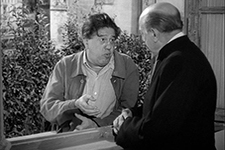La poison [Blu-Ray]
|

Sacha Guitry's La poison is a bitter pill of a black comedy about a marital relationship that has not just soured, but become positively toxic. The great, shambling French star Michel Simon (Paul Braconnier), whose hangdog mug would be fascinating to watch under just about any circumstances, and Germaine Reuver star as Paul and Blandine Braconnier, a couple that has been married for many, many years, each one of which has apparently done little but increase their mutual sense of loathing. They live in a small village in Normandy where everyone knows everyone else, and they make no bones about how they can't stand each other, with Paul giving the local priest (Jean Duvaleix) an earful about his woes and Blandine, a scowling lush, lugging herself around town with all the weight of her inebriated misery loaded on her slumped shoulders. Did I mention this is a comedy? Guitry was, along with Marcel Pagnol, a dramatist who shifted his attention to the cinema in the 1930s. Although he had previously professed a certain derision for the aesthetics of the movies, once he moved behind of and in front of a camera as writer, director, and actor, he never looked back, churning out nearly 30 features between 1935 and his death in 1957, the majority of which were adaptations of his plays, which he has successfully staged in the 1910s and '20s (he was the son of the great stage actor Lucien Guitry, to whom he was always trying to live up). Most of his works were witty takes on marital and family relations, and he often played the starring role. He also wrote historical plays and, once he became a film director, experimented with both form and content. La poison, which was one of his later films (he only directed seven after it), is fairly conventional in terms of its structure and form outside of his penchant for unconventional opening credits sequences, which in this case involves him literally introducing all the members of the cast and crew, opening with his reading of a long letter of admiration to Simon. It's an odd way to start the film, but very much in keeping with Guitry's style. The plot, which was an original story not based on one of Guitry's plays, ultimately hinges on Paul's desire to kill Blandine, an effort he pursues in a most interesting manner: He approaches Louis Aubanel (Jean Debucourt), a Parisian lawyer who is famed for getting murderers acquitted, and acts as if he has already killed his wife. He then listens to Aubanel's defense strategy and everything he mentions that would best protect him from conviction. It's a cunning strategy, and one that reflects well the film's amusingly bitter sense of not just the poison of human relationships, but also the twisted nature of the law and how it can be manipulated to ensure that justice is not served. Simon's casting as the would-be wife killer ensures that we don't detest him, even as he goes about some truly sordid business, and Germaine Reuver does everything she can to ensure that Blandine is seen as a loathsome life partner. The film's blatant misogyny is worn right out there on its sleeve (the title doesn't refer to poison, but rather to Blandine as a "pest"), although it is so comically exaggerated that it's hard to take offense, even if it leaves you with a slightly sour aftertaste. The lunch-time scenes between Paul and Blandine, in which they refuse to talk to each other and drown out the silence with radio broadcasts (including one that plays a cruelly ironic romantic ballad), are all we need to understand just how great is the gulf between them. Guitry's script and his direction keep the proceedings just light enough that they don't bog down into the characters' abject misery, but at the same time he is never quite able to elevate it beyond a rather obvious indictment of the vast moral failings of both the individual characters and the social environment that feeds their ill will (gossip is, not surprisingly, a significant element in the film, and at one point the village's most prominent citizens ask the priest to fake a miracle in order to increase tourism). Simon is, as always, a joy to watch, and he plays a tricky role in which his character evolves from what seems like a powerless sad-sack into a conniving brute who manipulates everyone around him (Aubanel describes him quite rightly as "a rather captivating monster"). The plot moves through its beats with a nice sense of rhythm that emphasizes the mundanity of the characters' lives without being dull. Yet, La poison is perhaps just a tad too bitter for its own good, or maybe not quite bitter enough. Simon may be a "monster," but he gets played like a shaggy underdog for whom we are meant to root. Or are we? Maybe that is La poison's sharpest, most cunnint trick: It forces us to pick sides in what is ultimately a losing game.
Copyright © 2017 James Kendrick Thoughts? E-mail James Kendrick All images copyright © The Criterion Collection | |||||||||||||||||||||||||||||||
Overall Rating:



 (3.5)
(3.5)
Subscribe and Follow
Get a daily dose of Africa Leader news through our daily email, its complimentary and keeps you fully up to date with world and business news as well.
News RELEASES
Publish news of your business, community or sports group, personnel appointments, major event and more by submitting a news release to Africa Leader.
More Information
